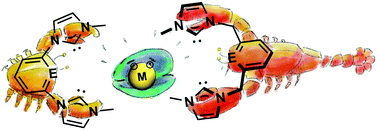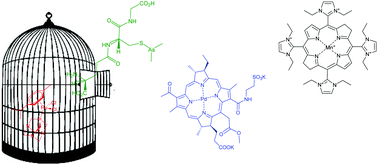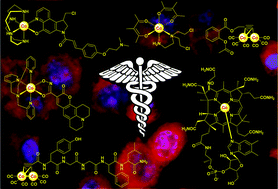We are delighted to present a selection of recently-published Dalton Transactions Perspective and Frontier articles by recent winners of Royal Society of Chemistry awards.

Dr Adrian Chaplin: 2015 Harrison-Meldola Memorial Prize winner
NHC-based pincer ligands: carbenes with a bite
Rhiann E. Andrew, Lucero González-Sebastián and Adrian B. Chaplin
Dalton Trans., 2016, 45, 1299
DOI:10.1039/C5DT04429D
In this frontier article we overview the emergence and scope of NHC-based CCC and CNC pincer systems, i.e. complexes containing mer-tridentate ligands bearing two NHC donor groups, comment on their effectiveness in applications, and highlight areas for future development and exploitation.

Professor Paul Dyson: 2015 Bioinorganic Chemistry Award winner
Metal-based drugs that break the rules
Claire S. Allardyce and Paul J. Dyson*
Dalton Trans., 2016, Advance Article
DOI: 10.1039/C5DT03919C
Cisplatin and other platinum compounds have had a huge impact in the treatment of cancers and are applied in the majority of anticancer chemotherapeutic regimens. The success of these compounds has biased the approaches used to discover new metal-based anticancer drugs. In this perspective we highlight compounds that are apparently incompatible with the more classical (platinum-derived) concepts employed in the development of metal-based anticancer drugs, with respect to both compound design and the approaches used to validate their utility. Possible design approaches for the future are also suggested.

Dr Kogularamanan Suntharalingam: Dalton Young Researchers Award 2014 Winner
Advances in cobalt complexes as anticancer agents
Catherine R. Munteanu and Kogularamanan Suntharalingam*
Dalton Trans., 2015, 44, 13796-13808
DOI: 10.1039/C5DT02101D
The evolution of resistance to traditional platinum-based anticancer drugs has compelled researchers to investigate the cytostatic properties of alternative transition metal-based compounds. The anticancer potential of cobalt complexes has been extensively studied over the last three decades, and much time has been devoted to understanding their mechanisms of action. This perspective catalogues the development of antiproliferative cobalt complexes, and provides an in depth analysis of their mode of action.
We will continue you update this blog post as more articles are published.













